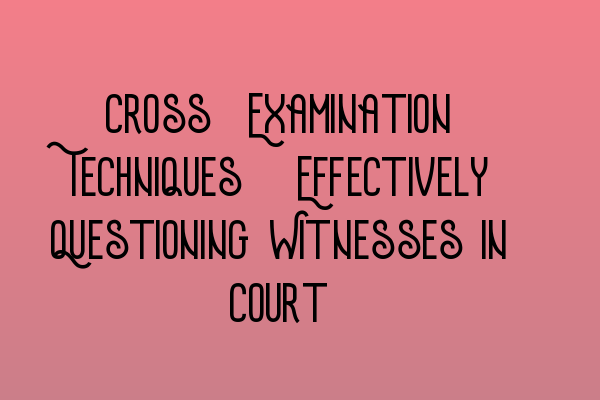Cross-Examination Techniques: Effectively Questioning Witnesses in Court
As a criminal law solicitor, mastering the art of cross-examination is crucial in achieving favorable outcomes for your clients. Cross-examination is the process of questioning witnesses from the opposing party during a trial. It offers an opportunity to challenge the credibility and reliability of the witness’s testimony, uncover inconsistencies, and ultimately strengthen your case. In this article, we will discuss effective cross-examination techniques that will help you become a skilled advocate in the courtroom.
1. Preparation is Key
Before entering the courtroom, thorough preparation is essential. Familiarize yourself with the case facts, witness statements, and any available evidence. Identify the key issues and objectives you want to achieve through cross-examination. This preparation will allow you to anticipate the witness’s responses and tailor your questions accordingly.
2. Establish Credibility
Building credibility with the jury or judge is crucial to effectively cross-examining witnesses. Present yourself as knowledgeable, composed, and respectful. Start with questions that establish the witness’s qualifications and expertise in the relevant field. This will give weight to your subsequent questioning and weaken the opposing party’s position.
3. Control the Narrative
During cross-examination, it’s important to control the narrative and steer the witness’s testimony in your desired direction. Use leading questions that prompt the witness to provide specific answers that support your case. Avoid open-ended questions that give the witness a chance to provide damaging information. Maintain control over the pace and flow of the questioning to maintain your confidence and authority in the courtroom.
4. Use Impeachment Techniques
Impeachment techniques are effective tools to challenge the witness’s credibility and expose inconsistencies in their testimony. Use prior inconsistent statements, bias, or motive to discredit the witness. Introduce contradicting evidence or highlight discrepancies in their previous statements. By doing so, you can weaken the opposing party’s case and strengthen your own.
5. Stay Focused and Listen Carefully
Effective cross-examination requires attentive listening. Pay close attention to the witness’s responses and body language. Listen for inconsistencies, evasiveness, or signs of deception. Stay focused and adapt your questioning strategy based on the witness’s answers. Skillfully follow up on any inconsistencies or loopholes in their testimony to undermine their credibility.
By employing these cross-examination techniques, you can effectively question witnesses in court and present a compelling case for your client. Mastering this skill requires practice, refinement, and a deep understanding of the legal principles at play. Continuously build on your experience and learn from each case to enhance your cross-examination skills further.
If you’re interested in learning more about solicitor qualifications and the legal field, check out the following related articles:
- Demystifying the Solicitors Qualifying Examination Format
- LLC Formation Made Simple: Step-by-Step Guide for UK Entrepreneurs
- LLC Formation: A Step-by-Step Guide for UK Entrepreneurs
- Business Regulations in the UK: A Comprehensive Overview
- Decoding Corporate Structures: A Comprehensive Legal Insight
